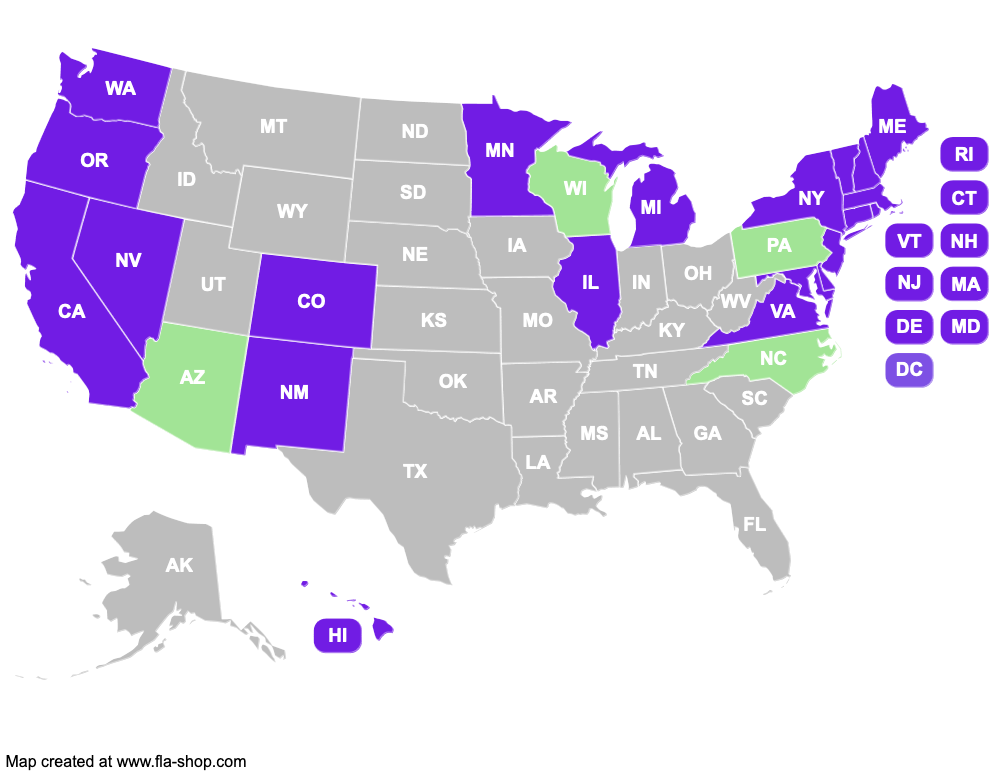Last month, RFI’s Nathan Berkeley wrote an essay for Public Discourse on how “The Michigan Conversion Therapy Ban Violates Human Nature and Religious Freedom.“ In subsequent research, RFI has found that “conversion therapy” bans with nearly identical language to Michigan’s are on the books in 21 states. The first one was enacted in California in 2012, and they represent similar threats to religious mental health practitioners working in those states. Four additional states — Pennsylvania, North Carolina, Wisconsin, and Arizona — have similar bans in place through executive orders. The bans in Wisconsin, Nevada, and North Carolina are more limited in scope in that they restrict government funding from going to services or programs involving “conversion therapy,” while not forbidding the practice generally. But they still employ the same overly expansive, harmful definition.

Given that these state bans mirror Michigan’s, they also prohibit efforts to change a person’s sexual behavior or “gender expression.” The inclusion of behaviors and expressions makes explicit what is usually obscured when “sexual orientation” and “gender identity” (SOGI) are employed in law. A closer look reveals why those aspects of SOGI are so pernicious. As Berkeley argued in Public Discourse:
When it comes to law, as well as social norms, it is time to stop treating behaviors and expressions as if they are, in themselves, innate and immutable aspects of the identities they purportedly reflect. In the context of ‘sexual orientation’ and ‘gender identity,’ such an approach is particularly troubling. Human desires and inclinations, and their fulfillment, are not good merely because they are experienced, named, and acted on. They must be examined based on standards beyond the self. In other words, no exclusively inward turn will settle these questions. And no law should try to force therapists to act otherwise.
Michigan’s ban on conversion therapy essentially compels religious therapists to treat certain psychological inclinations—and their expressions—as incontrovertible goods to be encouraged when counseling their child clients. It obliges them to compromise their professional judgment and commits them to a flawed view of the human person. For Catholics and many other people of faith, human beings are not merely subject to our desires and inclinations. Rather, we are responsible moral agents whom God created with the capacity to discern and pursue what is good in the midst of our many and varied inward experiences. Michigan’s ban is premised on a decidedly different anthropology. At the deepest level, this is the basis on which it undermines the free exercise of religion (and freedom of speech) of [Catholic and a range of other religious] therapists…
For these reasons, the “conversion therapy” bans in these 21 states do not “simply place some technical limit on those who work in the mental health profession. [They] instead validate and mandate a harmful conception of human nature and identity that is antithetical to the convictions of countless religious professionals who faithfully serve in this space.”
These bans, and the concerted effort that led to their enactment, demand scrutiny. And, whatever the initial intentions behind them were, they should be repealed.
THE RFI BLOG

Does Southeast Asia Lead the World in Human Flourishing?

RFI Leads Training Session on Religious Freedom Law and Policy for U.S. Army War College

Oral Argument in Charter School Case Highlights Unconstitutional Motives Behind OK Attorney General’s Establishment Clause Claim

Largest Longitudinal Study of Human Flourishing Ever Shows Religion’s Importance

Keys To Human Flourishing: Faith And Relationships Outweigh Wealth
CORNERSTONE FORUM

Reaffirming Religious Freedom: Bridging U.S. Advocacy and Iraq’s Constitutional Framework

Political Polarization, Same-Sex Marriage and Religious Liberty

Bridging the Gap Between International Efforts and Local Realities: Advancing Religious Freedom in the MENA Region

Challenges to Religious Freedom in Iraq and the Critical Need for Action

